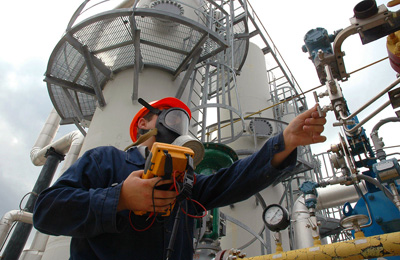
Low oil prices could affect capital expenditure in GCC.
Flat hydrocarbon growth to limit GCC economy
DUBAI, March 3, 2015
The GCC will see a real GDP growth of 2.8 per cent in 2015, slowing from 4 per cent in 2014 on account of flattish hydrocarbon production and softer non-hydrocarbon sector activity, a report said.
Real GDP growth in Saudi Arabia will be 2.5 per cent, while UAE and Qatar will see real GDP growths of 2.9 per cent and 4.8 per cent, respectively, added the BofA Merrill Lynch (BofAML) Global Research titled "BofA Macro Monthly – Doveman”.
“We would expect capital expenditures to bear the brunt of the adjustment, based on historical experience. We would expect GCC governments to attempt to maintain current spending programs. This should slow down investment growth and support consumption on a relative basis, in our view,” the report said.
“Saudi Arabia’s real GDP outturn in the fourth quarter of 2014 at 2 per cent highlights the dynamics we expect to prevail this year.
“Details suggest the slowdown is due to flat oil sector growth and weaker non-oil sector growth due to a weaker impulse from the government non-oil sector. The 2015 Saudi budget likely assumed oil at $60-65 per barrel, suggesting increased fiscal room in current market conditions. Still, the S&P outlook revision suggests potential downgrade within two years if oil prices stay low,” the report highlighted.
Dubai likely to soft land
“Tightening regional liquidity would make Dubai refinancings more challenging, but the imbalances are less pronounced than pre-2008, in our view,” said BofAML in the report.
“The pace of growth has been more modest and the banking sector is better capitalized, more liquid, and improved its net external position versus Bank for International Settlement banks, while credit trends have been much more contained than pre- 2008.
“Still, leverage remains high and the external sector is exposed to a slowdown. As for 2015 refinancings, the Dubai World deal provides breathing room, and we do not view Limitless debt difficulties as systemic. 2016 looks to be more challenging with roughly $6 billion in restructured debt coming due, including at the Dubai Holding level,” it said.
“We keep Dubai, Abu Dhabi and Qatar external debt at market weight,” the report said.
“We find Dubai at tight spreads given still high leverage and potential refinancing challenges. Abu Dhabi and Qatar’s savings cushion sovereign creditworthiness. We remain underweight Bahrain external debt as lower oil prices increase Bahrain’s fiscal strains given the still elevated fiscal breakeven oil price and with rating downgrades likely. However, tactically, stable oil prices could support EXD,” BofAML concluded. – TradeArabia News Service







